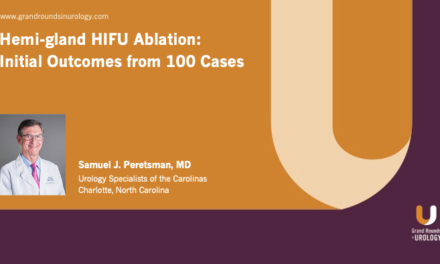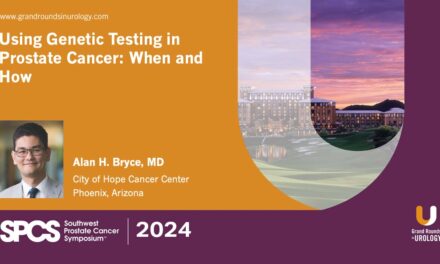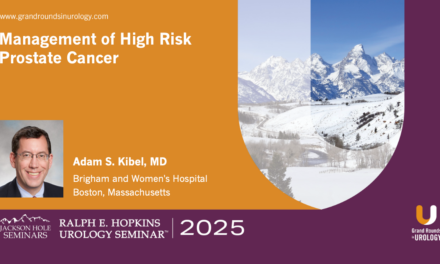Christopher J. Kane, MD, FACS, presented “Management of the Primary in Locally Advanced and Oligometastatic Disease” during the 33rd International Prostate Cancer Update on January 24, 2023, in Vail, Colorado.
How to cite: Kane, Christopher J. “Management of the Primary in Locally Advanced and Oligometastatic Disease.” January 2023, 2023. Accessed Jun 2025. https://grandroundsinurology.com/management-of-the-primary-in-locally-advanced-and-oligometastatic-disease/
Management of the Primary in Locally Advanced and Oligometastatic Disease – Summary
Christopher J. Kane, MD, FACS, discusses data regarding the management of the primary in locally advanced and oligometastatic prostate cancer. He reviews a study on the diagnostic accuracy of Gallium Ga 68 PSMA-11 injections used with a PET scan (68Ga-PSMA-11 PET) for pelvic nodal metastasis detection prior to radical prostatectomy (RP) and pelvic lymph node dissection. He explains that 68Ga-PSMA-11 PET is critical in the assessment of men with clinically localized high-risk prostate cancer and that many patients with negative PSMA scans and high-risk clinical features will have positive lymph nodes (N1) discoverable by 68Ga-PSMA-11 PET.
Dr. Kane cites updated National Comprehensive Cancer Network (NCCN) Guidelines that include a recommendation not to omit a node dissection based on PSMA PET results. He reviews findings from both the SPCG-7/SFUO-3 trial and the National Cancer Data Base (NCDB) retrospective review, emphasizing the value of treating the prostate in N1 disease. Data from the VA Informatics and Computing Infrastructure (VINCI) database shows that androgen deprivation therapy (ADT) with radiotherapy was associated with improved prostate cancer-specific mortality (PCSM) among patients with prostate-specific antigen (PSA) levels <26 ng/mL and with improved all-cause mortality (ACM) among those same patients.
Dr. Kane points to a similar analysis of VINCI data on patients who had undergone RP that found, compared with non-definitive therapy, RP was associated with significantly better PCSM and ACM. Compared to radiotherapy, RP was not associated with a significant difference in PCSM or ACM. Dr. Kane cites data showing a significant metastasis-free survival advantage among patients with a first postoperative PSA <0.2 ng/mL, a finding that has since been replicated.
Finally, Dr. Kane emphasizes the value of treating the primary with T3 in high-risk disease, with T3 and N1 in prostate cancer patients, and with radiotherapy in low metastatic burden M1 disease. He explains the threshold of metastatic burden effect is not well known and there is a clinical trial underway exploring RP and radiotherapy in the M1 population with the current standard of care, and he reiterates that pathological N1 patients benefit from salvage IMRT/ADT.
About The 33rd Annual International Prostate Cancer Update:
The International Prostate Cancer Update (IPCU), founded in 1990, is a multi-day CME conference focused on prostate cancer treatment updates with expert, international faculty. It is led by expert physicians and is designed for urologists, medical oncologists, radiation oncologists, and other healthcare professionals involved in the diagnosis and treatment of prostate cancer. The 33rd iteration of the meeting occurred January 22-25, 2023 in Vail, Colorado. To view more educational presentations from IPCU 33, visit our collection page.
ABOUT THE AUTHOR
Christopher J. Kane, MD, FACS, is Dean of Clinical Affairs at the University of California (UC), San Diego School of Medicine. He is also Chief Executive Officer (CEO) of UC San Diego Health Physician Group and Professor of Urology at UC San Diego Health. Dr. Kane is on the Executive Governing Board of UC San Diego Health Sciences and the Executive Committee of UC San Diego’s Clinical Integration Network. In addition, he is the president of the Western Section American Urological Association (AUA) and trustee of the American Board of Urology (ABU).
Dr. Kane is an internationally recognized expert in prostate cancer and kidney cancer epidemiology, risk stratification, and outcomes after treatment. He completed his urology residency at Oakland Naval Hospital and UC San Francisco. Dr. Kane earned his medical degree at Uniformed Services University in Bethesda, Maryland, and his BS degree in mechanical engineering at UC Davis. From 2009 to 2016, he was Co-Chair of the Renal Cell Carcinoma Advisory Task Force, National Cancer Institute. Dr. Kane is on the AUA guidelines in prostate cancer committee and was elected to the American Association of Genitourinary Surgeons (AAGUS) in 2014. In 2017 Dr. Kane was elected to the Clinical Society of Genitourinary Surgeons (GSGUS). He was selected as a “Top Doctor” in San Diego in 2008-2022. In 2010, he was selected as one of two Physician Healthcare Champions in San Diego by the San Diego Business Journal and was awarded the Distinguished Engineering Alumni Medal by UC Davis in 2011. Dr. Kane is a retired Navy Captain and a decorated veteran of Desert Storm. He has authored over 370 publications and book chapters, primarily on prostate cancer risk factors and outcomes, prostate cancer surgery, and minimally invasive surgery for prostate and kidney cancer.




